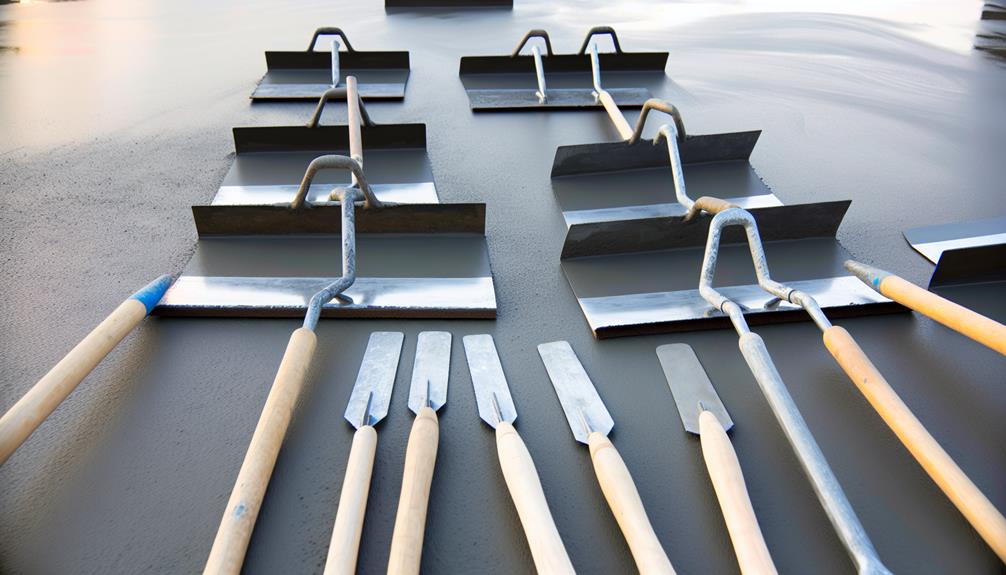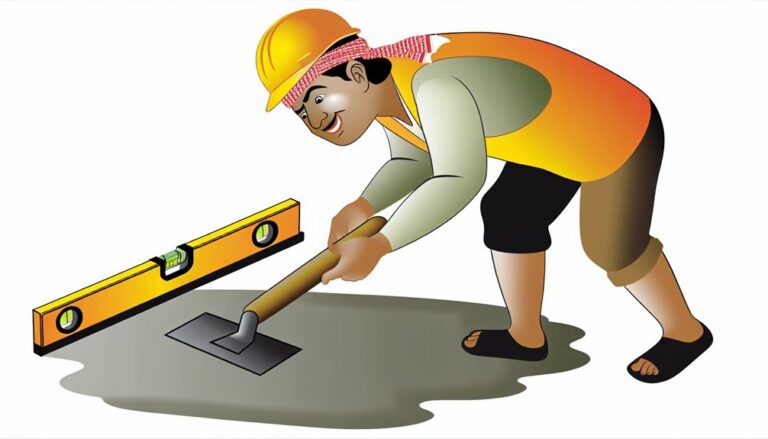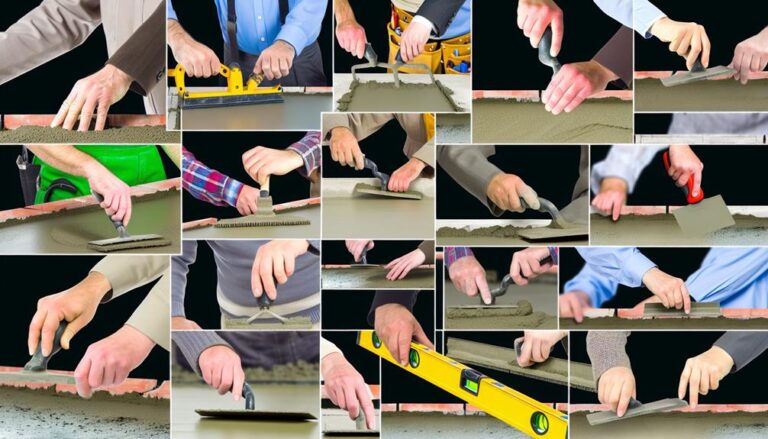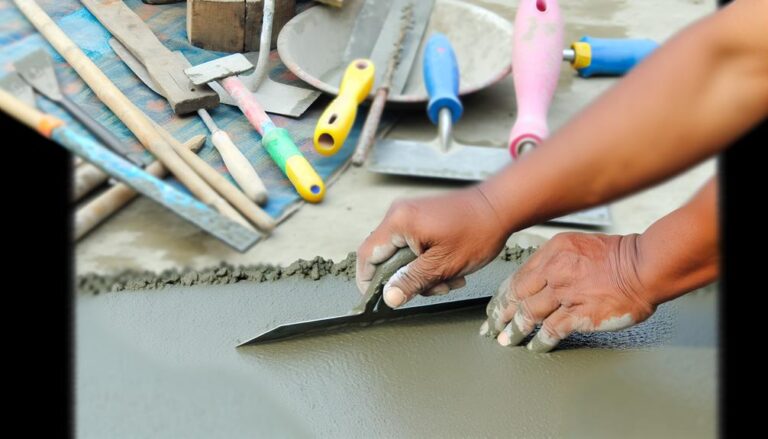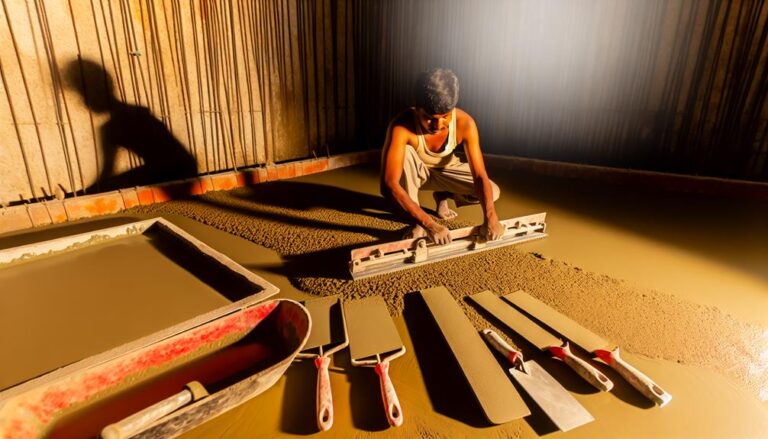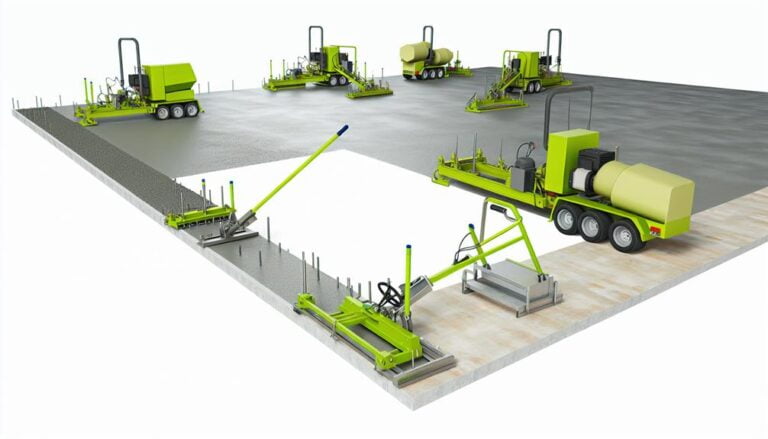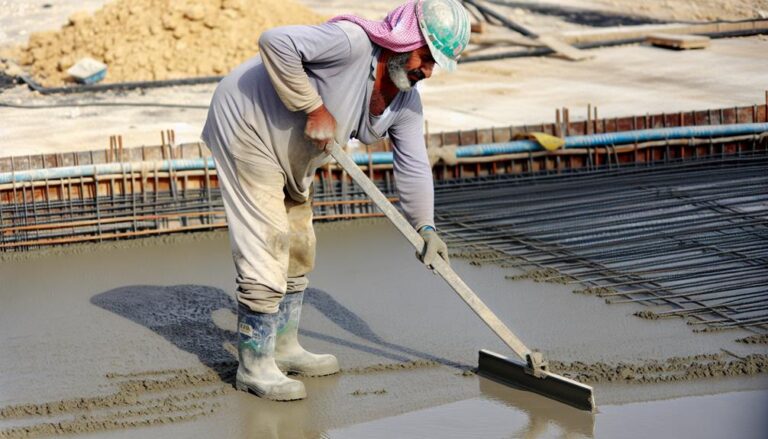3 Essential Equipment for Concrete Leveling
For concrete leveling, you'll need three key pieces of equipment. First, grab a concrete leveler to easily identify and correct uneven surfaces. Next, get a concrete mixer to ensure your material is uniformly mixed and ready for application. Lastly, a screed is necessary for smoothing and leveling the concrete after it's poured. Once you've got these essential tools, you're well on the way to achieving a perfectly leveled concrete surface. Stay tuned if you're interested in learning about effective usage of these tools.
Understanding Concrete Leveling Process
Before you dive into the nitty-gritty of concrete leveling, it's essential to understand the process from start to finish. This procedure, often referred to as mudjacking or slabjacking, is a cost-effective method to rectify uneven or sinking concrete surfaces.
The first step is to identify the problem areas. These are usually sections where the concrete has sunk, causing an uneven surface or potential trip hazard. Once you've pinpointed these spots, it's time to prepare for the actual leveling.
The next phase involves drilling holes into the uneven concrete slab. You'd typically drill small, strategic holes that will later serve as entry points for the leveling material. It's crucial to position these holes correctly to ensure an effective lift.
Following this, a special mixture, often made up of cement, soil, sand, and ash, is pumped into the drilled holes. As this mixture fills the void underneath the slab, it exerts upward pressure, causing the concrete to rise and level out.
Essential Equipment for Concrete Leveling
Now that you're familiar with the concrete leveling process, let's explore the equipment you'll need to get the job done right.
First off, you'll need a concrete leveler, a crucial tool for ensuring a flat surface. It comes in different sizes, so you can choose depending on the scope of the project.
You'll also need a concrete mixer, which will help you combine the cement, sand, and water in the right proportions. It's an essential piece of equipment for producing consistent, quality concrete.
Then, there's the screed, a long, straight tool used to smooth and level the concrete after it's poured.
You'll also need a bull float, a large flat tool that's used to compact the concrete surface and bring the smaller particles to the top for a smoother finish.
You shouldn't forget your protective gear, too. Safety glasses, gloves, and sturdy boots are essential to protect you from potential hazards.
Lastly, you'll need a concrete grinder for finishing. It helps to smooth any rough patches and give your concrete a polished look.
Effective Usage of Concrete Leveling Tools
To effectively use concrete leveling tools, it's crucial to understand their specific applications and how each one contributes to the overall process. You can't just pick up any tool and expect it to do the job. Each tool is designed for a specific task, and using it correctly is key to achieving a smooth, level surface.
For instance, a concrete screed is used to level the concrete after it's been poured. You must drag it across the surface in a sawing motion, which helps to push excess concrete out of the way and fill in low spots.
Next, you'll need a bull float. You use this tool right after screeding, to smooth out any imperfections and bring the finer particles to the surface, creating a hard, smooth finish.
Frequently Asked Questions
How Much Time Is Typically Needed for Concrete Leveling?
You're wondering about the typical time requirement for concrete leveling. It's not a one-size-fits-all answer. Factors like the size of the area, ground conditions, and the type of leveling method used can influence the duration.
Generally, a small project could take a few hours, while larger ones could take a couple of days. Always allow additional time for the concrete to cure. It's best to consult with a professional for a more accurate estimate.
Can Concrete Leveling Be a DIY Project or Should It Be Left to Professionals?
Sure, you can tackle concrete leveling as a DIY project, but it's not recommended unless you've got the right experience and tools. It's a labor-intensive task requiring precision and know-how. If you're off even a little, it can cause significant problems.
You'll need a concrete grinder, leveling compound, and other equipment. For most people, it's best to leave this job to the professionals. They've got the training and equipment to do it right.
What Are the Potential Risks or Hazards Involved in Concrete Leveling?
When tackling concrete leveling, you're exposed to risks like back injuries from heavy lifting, exposure to cement dust, and even injuries from equipment misuse. If you're not properly trained, you might also end up with uneven surfaces or structural weaknesses.
How Much Does It Usually Cost to Hire Professionals for Concrete Leveling?
You're curious about the cost of hiring professionals for concrete leveling. It's not a straightforward answer as prices can vary greatly.
Factors influencing the cost include the size of the area, the degree of leveling required, and your location. On average, you could expect to pay between $500 to $1,500.
However, for large or complex jobs, the cost could go up to several thousand dollars. It's best to get several quotes before making a decision.
What Are the Environmental Impacts of Concrete Leveling?
You're curious about the environmental impacts of concrete leveling, aren't you?
Well, there's good and bad news. On the plus side, it uses less concrete and reduces waste, as it repairs instead of replaces. However, it can disrupt local ecosystems and contribute to air and noise pollution.
Also, the machines used are often fuel-intensive, which increases carbon emissions. Therefore, it's essential to consider these factors when planning for concrete leveling projects.
Conclusion
So, you've got the lowdown on concrete leveling. It's clear, right? It's as simple as baking a cake, but instead of a whisk, you've got your concrete grinder. Instead of a spatula, you have the screed. And let's not forget the vibratory plate, the icing smoother of the construction world.
With these tools at your disposal, you're no longer a novice. You're a maestro, ready to make the ground beneath your feet as even as a dance floor.
